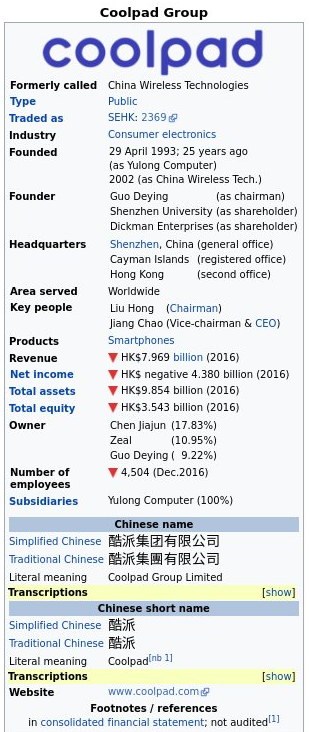

Reference: Coolpad
THE DEMISE of BlackBerry (like a hundred-fold decline in terms of revenue) has meant that it is being reduced -- however gradually -- into a patent troll. The company's patent activities are being noted in this new article, "What's Driving Our $11 Price Estimate For BlackBerry?"
We're just days away from yet another Apple v. Samsung trial in the Northern District of California. IT's a re-retrial over damages, following a trial, a retrial, Samsung's successful appeal to the Supreme Court and various other procedural steps on the way back to where we are. By the way, the dispute started more than seven years ago (mid-April 2011).
Judge Koh's final jury instructions will inform the jury of the relevant factors for the article-of-manufacture determination. If the jury determines the relevant AoM is an entire smartphone, Apple gets a huge damages award. If the jury concludes the casing/screen is more reasonable, then the amount will be less extreme amount, but still a chunk of money.
[...]
"Determinative" is not part of everyday language, but it isn't too uncommon either. Reasonably educated people should figure out what it does mean and what it doesn't. Numerous other passages of the preliminary and final jury instructions contain words that jurors may misunderstand in similar ways as Apple fears.
The parties couldn't agree, so Judge Koh will have to decide. Technically, "not determinative" is simply accurate. In colloquial language, one could add a few words like "in their own right," though one could also argue that any additional words could create confusion, too.
Generally speaking, Judge Koh's proposed preliminary and final jury instructions combined don't really tell the jury much about how to make the article-of-manufacture determination. For an example, the amicus curiae brief filed by the Obama Administration with the Supreme Court contains additional helpful guidance that Judge Koh could, but apparently won't, provide to the jury.
The U.S. District Court for Northern California will be rehearing arguments next week in a major design patent case between the two tech giants Apple and Samsung. The case could very well be a turning point for the future of the tech industry. Major technology companies have largely weighed in on the side of Samsung as the industry worries about the long term impact of the case and its potential to empower a new breed of design patent trolls and encourage more litigation.
Apple Inc. launched a tense legal fight over whether some design features of its iPhone were infringed upon by Samsung devices. The dispute resulted in a longstanding legal dispute which eventually made its way to the U.S. Supreme Court. Apple argued that it could claim remedies equivalent to the total profits of an entire smartphone if even one design patent was found to infringe. This awarding of total profits came from a 19th century law written long before a multifunctional device as complex as a smartphone could be imagined.
Procedurally, this is an appeal to the Federal Circuit, based on the rule that any case involving at least one patent infringement claim must be appealed to the Federal Circuit, which, however, applies the law of the regional circuit in question if an issue is not about patent law in a strict sense (infringement, validity etc.). So in this case, the Federal Circuit will act as if it were the Ninth Circuit--or at least it will try to.
[...]
As for political/diplomatic implications (also called "international comity"), it's actually a positive thing for Samsung in this case that it's not a U.S. company. In some other cases, such as Apple v. Samsung, it would benefit from it, but in this dispute with Huawei and in times of "trade war," it's a good thing that this is a dispute between foreign companies--and let's not forget that the Northern District of California was Huawei's venue choice when it brought its cross-jurisdictional complaints.
After noticing intellectual property right violations three months ago, Coolpad notified Xiaomi and since the latter hasn’t yet taken any action, Coolpad has requested that eight Xiaomi devices be recalled from the market. In addition to that, the company also wants compensation for economic losses resulting from patent infringement.
Coolpad filed the lawsuit through Yulong Computer Technology, their subsidiary company, at the Shenzhen Intermediate People’s Court. One of the patents behind this controversy is related to software, being termed as ‘method for implementing call record interface system of multi-mode mobile communication terminal,’ as per MyDrivers. Other infringements relate to app icon management, notifications and the system’s user interface (UI).
Coolpad has filed a lawsuit against Xiaomi regarding patent infringement. From a hint revealed by the company's CEO, it was thought that the lawsuit has been settled outside the court. But that's not the case. Coolpad has come up with an announcement that the lawsuit it filed against Xiaomi is before the Shenzhen Intermediate People's Court. Notably, the lawsuit has been filed by Yulong Computer Technology, its subsidiary.